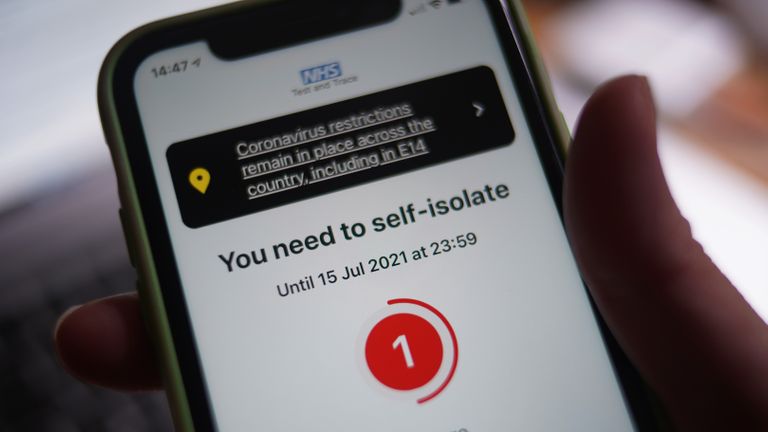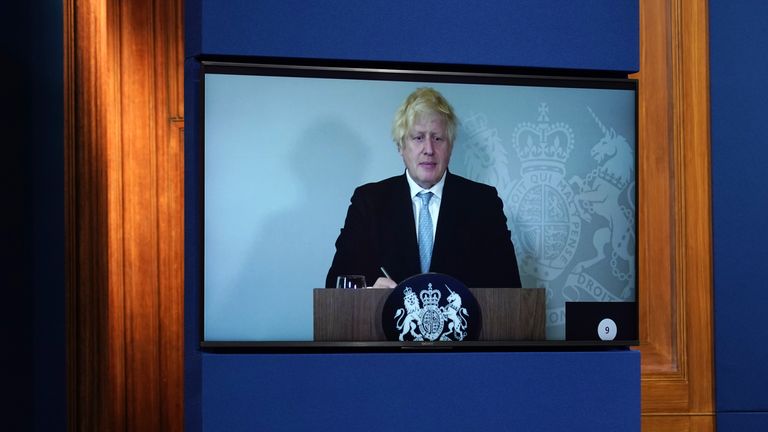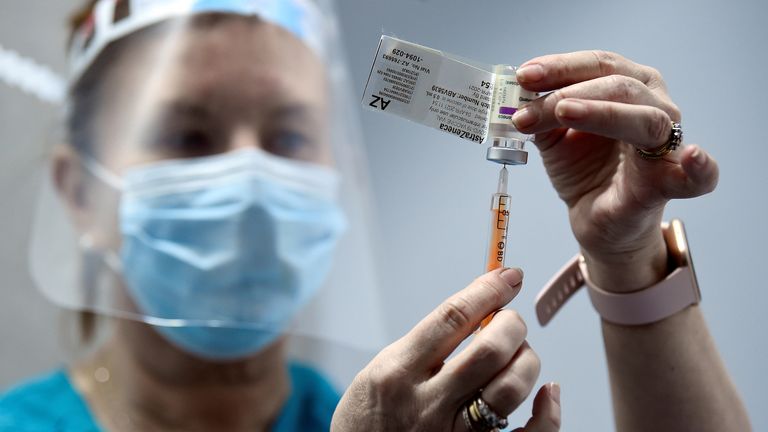COVID tests ‘won’t be compulsory’ for fully vaccinated people to avoid isolation if ‘pinged’ from 16 August
Fully vaccinated people will not be legally required to take a coronavirus test to avoid isolation if “pinged” from 16 August.
It has already been announced by the government that people who have been double jabbed will no longer have to isolate after contact with someone who tests positive for COVID-19 from that date.
Instead, it had been expected that people would have to take a test to leave isolation.
But Health Secretary Sajid Javid confirmed the tests will be recommended rather than mandatory – unless you develop symptoms.
Live COVID updates from UK and around the world
“Well what we are planning to do on 16 August is, as you say, first – if you have been double jabbed, you won’t need to self-isolate but we will be certainly recommending that they get tested and that will be the advice,” Mr Javid said.
Asked if it will be obligatory, Mr Javid added: “It won’t be compulsory.”
It means individuals who have received two vaccine doses by the mid-August date will neither have to isolate or take a coronavirus test if they are identified as a close contact of a positive case unless they themselves feel unwell.
This will be the case whether someone is alerted via the app or through a call from NHS Test and Trace.
Reacting to the change on social media, chief executive of UKHospitality Kate Nicholls said: “Good news if this is the case but businesses need to urgently know the rules they are applying from 16 August and also need to have a workable test to release regime for those workers not fully vaccinated by that date – particularly key for hospitality.”
The decision to further loosen isolation rules comes in the week that Prime Minister Boris Johnson exited his own period of self-isolation.
The prime minister and Chancellor Rishi Sunak were forced into quarantine after they were identified as close contacts of Health Secretary Sajid Javid who tested positive for the virus.
And last week, Labour leader Sir Keir Starmer was told to isolate after one of his children contracted COVID-19.
Currently, people who are alerted by the NHS coronavirus app after coming in to contact with someone who has the virus must quarantine for 10 days no matter of their vaccine status – with a few exceptions including emergency workers.
If an individual is told to isolate by NHS Test and Trace the isolation period is legally mandated, whereas if they are notified by the app it is only advised.
This rule will change on 16 August, when the government hopes to scrap isolation for those double-jabbed unless they get symptoms of the virus.
But ministers are under pressure from business leaders to bring this date forwards with concerns about the number of people being forced into isolation due to the so-called “pingdemic”.
More than 600,000 people were forced to quarantine in the week up to 14 July.
On Wednesday, the number of infections in the UK fell for the seventh day in a row, with 23,511 new COVID-19 cases and 131 more coronavirus-related deaths in the latest 24-hour period.
But the figures showed the highest number of daily deaths since 17 March, when 141 fatalities were reported.
Earlier this week, the government expanded the list of sectors able to avoid quarantine as part of a pilot scheme.
They also increased the number of testing sites across England – with 1,200 new sites being added to 800 already in operation.
The expanded scheme will now include people working in prisons, defence, communications, space, fish and HMRC, the government said.
Last week, the government announced that individuals in frontline roles such as police, fire and the Border Force would move to daily lateral flow testing instead of having to isolate – regardless of vaccine status.
Emergency service workers and other critical staff, including those in transport, freight and haulage, were already eligible to be exempt but only if their employers specified their names and that they were double jabbed.


